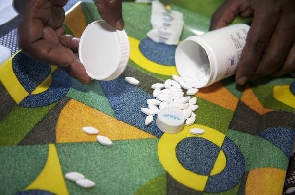HIV positive Zimbabweans living in countries such as South Africa and Botswana face health-related challenges due to failure to access their anti-retroviral therapy because of travel restrictions imposed under the neighbours' lockdowns.
Most patients living in the neighbouring countries rely on cross-border transporters popularly known as Omalayitsha, and long-distance buses to transport their medication from home.
Health facilities in hosting countries do not afford foreigners access to Antiretroviral drugs (ARVs).
Under their lockdown measures, the countries shut down their borders for all transport except for freight.
Some relatives to patients based in the two countries told NewZimbabwe.com they were stuck with the life-prolonging drugs and were clueless on how to relay them to their loved ones.
"I always collect ARVs at Mpilo Opportunistic Clinic (OI) on behalf of my husband who is working in South Africa," said a woman who preferred to remain anonymous for fear of stigmatization.
"I normally use Omalayitsha who often charge me R100 to transport the drugs to South Africa. Since the lockdown started here and in South Africa, I have not been able to send the drugs. My husband has already skipped his medication for some weeks."
Drivers of the haulage trucks plying the South Africa/Zimbabwe routes were reportedly taking advantage of the situation to demand exorbitant payments to transport the drugs.
"Last week, I was charged R300 to transport a small container of ARVs to Johannesburg for my brother," said another relative.
"I had no choice because he desperately needed the medication."
He said he feared his brother could default on treatment and end up being placed on second-line antiretroviral therapy which is very costly.
The National Aids Council (NAC) confirmed a lot of HIV patients in South Africa and Botswana were in crisis.
"As NAC, we are still trying to make a follow-up on how many patients have been affected by this problem," NAC Bulawayo provincial manager, Sinatra Nyathi told NewZimbabwe.com.
"What we have however discovered is that relatives of these patients are still collecting the drugs from the local health facilities."
The NAC official advised affected patients to approach approved health facilities in their host countries and present their cases.
"Covid-19 is a global pandemic and we encourage all the affected patients to approach approved health facilities in the neighbouring countries and present their cases. I am sure they will be able to assist," said Nyathi.
She also advised desperate patients to use other alternative courier services such as Omalayitsha.Com and cross border haulage trucks.
Although the NAC official could not give statistics of Zimbabwean HIV positive patients in the two neighbours, a significant number of HIV positive locals are believed to be living in the two countries.
"Currently, we do not have a data base of HIV positive patients in the two countries but our records from the local health facilities indicate that relatives are collecting the drugs on behalf of the patients who are based in the diaspora," she added.
Health experts recommend timeous, consistent, and correct intake of ARVs for patients already on treatment.
Africa News of Monday, 1 June 2020
Source: allafrica.com

















